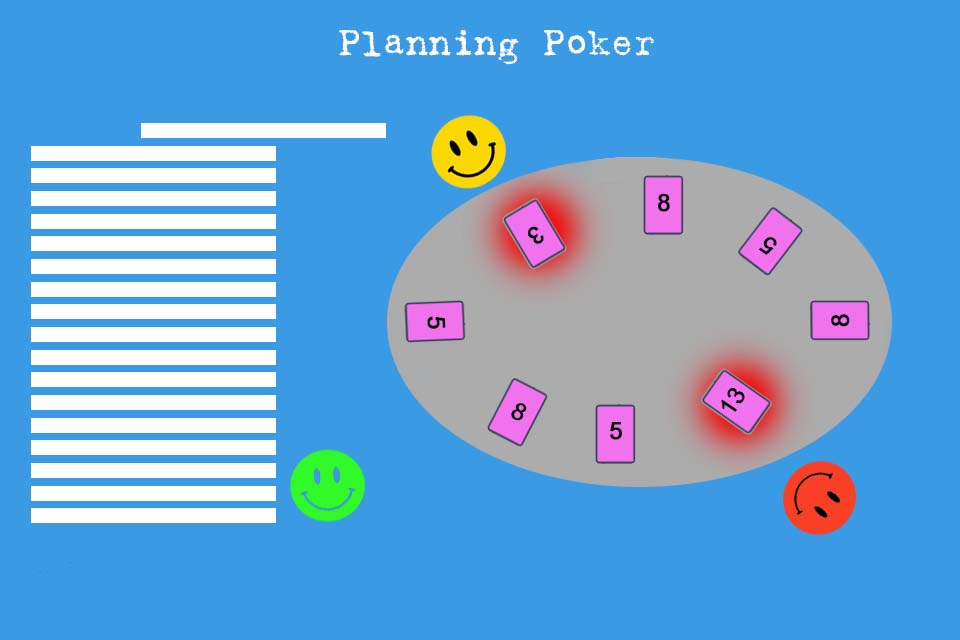Effortless Planning Poker in Slack. StoryPlan helps you efficiently estimate agile stories by helping you conduct Planning Poker right inside your Slack channel. No need to send individual DMs, or juggling through a myriad of tools. Everything happens where your team lives, your Slack project channel. Steps to start a Planning Poker. To start a Planning poker session, the customer or the product owner should read an agile story or describe a feature of the estimators. Each estimator would be holding a deck of planning poker cards with values like 0,1,2,3,5,8,13,20,40,100 which is the sequence that is recommended. Have multiple agile teams that might be interested? No problem, pointing poker can handle any number of teams simultaneously! Desktop, tablet, and mobile ready There's no need for the people on your team to compromise on their preferred platform. The pointing poker tool works in all environments. Planning poker is mostly used to estimate the effort or the relative size of tasks in software development. The members of the project team come together and estimate each item in a few rounds using the planning poker cards until the team reaches consensus on the size of each item or task.
What is Planning Poker?
Planning Poker is an agile estimating and planning technique that is consensus based. To start a poker planning session, the product owner or customer reads an agile user story or describes a feature to the estimators.
Each estimator is holding a deck of Planning Poker cards with values like 0, 1, 2, 3, 5, 8, 13, 20, 40 and 100, which is the sequence we recommend. The values represent the number of story points, ideal days, or other units in which the team estimates.
The estimators discuss the feature, asking questions of the product owner as needed. When the feature has been fully discussed, each estimator privately selects one card to represent his or her estimate. All cards are then revealed at the same time.
If all estimators selected the same value, that becomes the estimate. If not, the estimators discuss their estimates. The high and low estimators should especially share their reasons. After further discussion, each estimator reselects an estimate card, and all cards are again revealed at the same time.
The poker planning process is repeated until consensus is achieved or until the estimators decide that agile estimating and planning of a particular item needs to be deferred until additional information can be acquired.
When should we engage in Planning Poker?
Most teams will hold a Planning Poker session shortly after an initial product backlog is written. This session (which may be spread over multiple days) is used to create initial estimates useful in scoping or sizing the project.
Agile Planning Poker Cards Pdf
Because product backlog items (usually in the form of user stories) will continue to be added throughout the project, most teams will find it helpful to conduct subsequent agile estimating and planning sessions once per iteration. Usually this is done a few days before the end of the iteration and immediately following a daily standup, since the whole team is together at that time anyway.
How does poker planning work with a distributed team?
Simple: go to PlanningPoker.com. Mountain Goat Software helped develop that website to offer it as a free resource to the agile community. A product owner, ScrumMaster or agile coach can log in and preload a set of items to be estimated. A private URL can then be shared with estimators who log in and join a conference call or Skype session. Agile estimating and planning then proceeds as it would in person.
Does Planning Poker work?
Absolutely. Teams estimating with Planning Poker consistently report that they arrive at more accurate estimates than with any technique they'd used before.
One reason Planning Poker leads to better estimates is because it brings together multiple expert opinions. Because these experts form a cross-functional team from all disciplines on a software project, they are better suited to the estimation task than anyone else.
After completing a thorough review of the literature on software estimation, Magne Jørgensen, Ph.D., of the Simula Research Lab concluded that “the people most competent in solving the task should estimate it.”
Second, a lively dialogue ensues during poker planning, and estimators are called upon by their peers to justify their estimates. Researchers have found that this improves estimate accuracy, especially on items with a lot of uncertainty as we find on most software projects.

Further, being asked to justify estimates has also been shown to result in estimates that better compensate for missing information. This is important on an agile project because the user stories being estimated are often intentionally vague.

Additionally, studies have shown that averaging individual estimates during agile estimating and planning leads to better results as do group discussions of estimates.
How can I get Planning Poker cards?

Planning Poker cards are available in the Mountain Goat Software store. Mountain Goat Software's branded Planning Poker cards are sold at cost as a courtesy to the agile community.
Our full-color cards are the absolute highest-quality cards available anywhere. They are manufactured by the same company that prints many of the world's most popular playing card brands, including Bicycle, Bee, and the World Poker Tour.
We also offer royalty-free licenses to organizations that wish to produce their own cards. The license is available here: https://www.mountaingoatsoftware.com/agile/planning-poker/license
Recommended Resources Related To Planning Poker
- How Can We Get the Best Estimates of Story Size?
- The Best Way to Establish a Baseline When Playing Planning Poker
- Don’t Average During Planning Poker
- Agile Estimating
Courses Related To Planning Poker
Poker Meeting Agile Strategy
Scrum Foundations Video Series
All the foundational knowledge of Scrum including: the framework, values, different roles, meetings, backlogs, and improving efficiency & quality.